












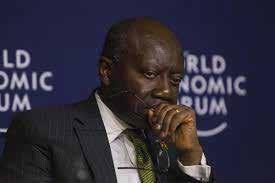 By Eugene Davis
By Eugene Davis
International credit rating agency Fitch Solutions has emphasized that a change of Finance Minister, Ken Ofori-At ta, will not derail the IMF nego tiations, while forecasting an agreement would be reached by year.


In its recent report, the agency maintained that should the
negotiations with the IMF would likely remain largely
“We believe that in this scenar would happen quickly and delays in talks with the IMF.
While Ofori-Atta had remained opposed to an IMF bailout we believe that he would take a more accommodative approach towards negotiations with the Fund. As such, we believe that a would most likely not impact the timeline of IMF negotiations
and we would retain our view reached in Q23.”
The report cautioned the government it may face regular protests and industrial action in the wake of ongoing IMF negoti reforms.
According to its latest report outlook, it revealed that an 80-member faction within the ruling New Patriotic Party opposed to Finance Minister Ken Ofori Atta could paralyse policy making in order to pressure President Nana Akufo-Addo into replacing him.
The government will face addi tional pressure from more frequent protests and industrial action in light of a likely IMF programme.
“We at Fitch Solutions believe that political risk in Ghana will increase over the coming months due to growing divisions
within the ruling party. We believe there is scope that this faction could abstain from voting or vote against Further the outlook from Fitch points of a growing public discon tent amid weakening economic conditions. “Worsening living standards amid rising consumer
y-o-y in October 2022, the highest reading since 2001 -tighter mone tary conditions have led to a 72.7% q-o-q increase in protests and riots across in Q23.”
The Minority in parliament on November 8,2022 submitted a motion of censure to remove the
mismanagement of the economy and alleged unconstitutional withdrawals from the govern ment’s Consolidated Fund to build a Cathedral, while the motion was blocked by the ruling majority, however the majority has demanded that President Akufo-Addo dismisses Ofori-Atta.
spend almost 5 percent of their GDP in adapting to its impacts, said Antonio Pedro, Acting Exec utive Secretary of the Economic Commission for Africa (ECA), on the margins of COP27.
The continent already has an infrastructure nancing gap of more than $100 billion per year, according to the African Develop ment Bank.
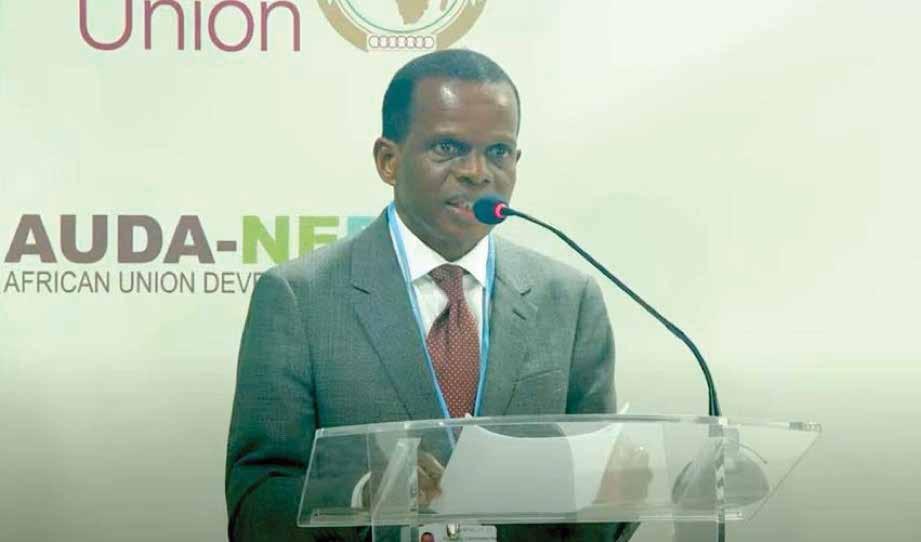
There is a case for Africa to ramp up investment in developing infrastructure that is vital to improving the standards of living for the African citizens as well as for the continent’s global compet itiveness.
The Executive Secretary noted that the Africa Climate Resilient Investment Facility (AFRI-RES) was a boost to climate proo ng infrastructure in Africa.
“There is an urgent need to close Africa’s infrastructure de cit at
various national development plans, the UN 2030 Agenda for Sustainable Development, and Agenda 2063,” said Mr. Pedro.

The Executive Secretary noted that closing the infrastructure development gap means invest ing up to US$170 billion per year in sectors such as energy, trans port, water, sanitation, urban, and ecosystems.
These sectors are sensitive to the adverse impacts of climate change, including more frequent and intense oods, droughts, and heatwaves.
“Against a background of increas ing climate change impacts that are already costing Africa on average 5% of GDP per year, it is important to boost the con dence that the infrastructure investments will deliver services and return on investments in both today and tomorrow’s climate,” the Executive Secretary
Enhancing the Climate Resilience of Africa’s Infrastructure (ECRAI) by the World Bank and the ECA has shown that some river basins – such as the Orange River Basin and Congo River Basin - could become wetter under certain scenarios of global emissions pathways.
In addition, some river basins such as the Zambezi River Basin could become drier and lose up to 60% of hydropower production potential with resulting huge increases in energy costs.
Mr. Pedro stated that in 2016 the Kariba dam on the Zambeziwhich supplies most of the elec tricity consumed in Zimbabwe and Zambia - almost shut down as the volume of water in the reser voir dropped to about 12% of capacity because of the unusual El Nino and La Nina events of 2015/2016 attributable to climate change.
The ndings of the report led to
the establishment of the Africa Climate Resilient Investment Facility – AFRI-RES – supported by the Nordic Development Fund. The AFRI-RES facility supports countries, regional entities such as river basin commissions, and projects developers with the capacity and tools to integrate climate resilience in investments in key sectors.
AFRI-RES is a joint initiative of the ECA, the African Union Commis sion, and the African Develop ment Bank. During its rst phase, the ECA and the AUC have led the component of training and advo cacy and also the development of a climate knowledge and informa tion portal.
“Africa can take advantage as a late comer in infrastructure devel opment to make sure that it builds quality climate resilient infra structure,” said Mr. Pedro, high lighting that the capacity and tools provided by AFRI-RES are critical inputs in the development agenda for Africa.
The CEO of the Ghana Enterprises Agency (GEA), Kosi Yankey-Ayeh, has encouraged bene ciaries of the second phase of the Ghana Economic Transformation Proj ect (GETP) grant to make the most of the funds given them to ensure that their businesses become pro table.
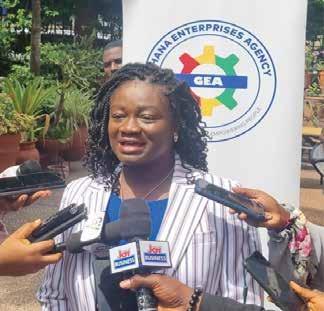
The grant is to provide liquidity and support to enable SMEs to adjust and grow out of the Covid-19 crisis in selected sectors of the economy, with one hun dred and thirty- ve (135) small medium enterprises (SMEs)
By Eugene Davisexpected to bene t from GH
The programme, under the Ghana Economic Transformation Project, will have a strong focus on Ghanaian export-oriented rms, female-owned enterprises, companies owned by persons with disability and youth enter
Speaking at the grant agreement signing and orientation ceremo ny in Accra on Wednesday, she said “so today, we are giving you support as you go out there, we will come, monitor the work you doing, those who don’t use it for what is supposed to be used for, would have to refund the money. But there are team of consultants from the World Bank and other partners who will come to make sure you are implementing.
The success of your work and what you do with the funds will determine if in the second stage we are going to support you. For those who bene tted from the CAPBUSS, who have started
paying, we would use that to judge if we should accept this contract and give you any fund ing. For those who will use it think of the number of jobs, opportunities we will create for others.”
Under the Covid Response Grant, Mrs. Yankey-Ayeh indicated that they have provided support, funding to build the businesses and to stabilize them and in the rst phase, 370 businesses were supported.
Further she added that in the second phase, which is what they working on now, in this current phase of the group, they have already done disbursement for the rst group, and currently are at the second group phase.
“The idea is to give them access to funding based on their applica tions they have put together to build and grow their businesses, and to support them, so we look across the spectrum women, persons with disability -this time we pay a close attention to them,
so when the project rst phase ended, we made a strong case to the World Bank and Ministry and Finance, and the case we made was that, there is still a major need because you still see there were a lot of businesses that had not received the funds and they were generous enough to give us the funding that will help them grow their business and support and that is what we seek to do.”
A Deputy Minister of Trade and Industry, Nana Ama Dokua Asia mah-Adjei, underscored the desire of government to “nurtur ing the interest of more SMEs, promotion and development in the country.”
For the minister, it forms part of government’s rm resolve for the private sector to recover from the lingering ruins of the pandemic.
Bene ciaries that qualify for the grant includes SMEs that are in sectors including agriculture,a gro-processing, manufacturing, textiles and garments as well as tourism and hospitality industry.
work and assignments.
In a world where technology is leading the charge in almost every facet of life, educational institutions are constantly under
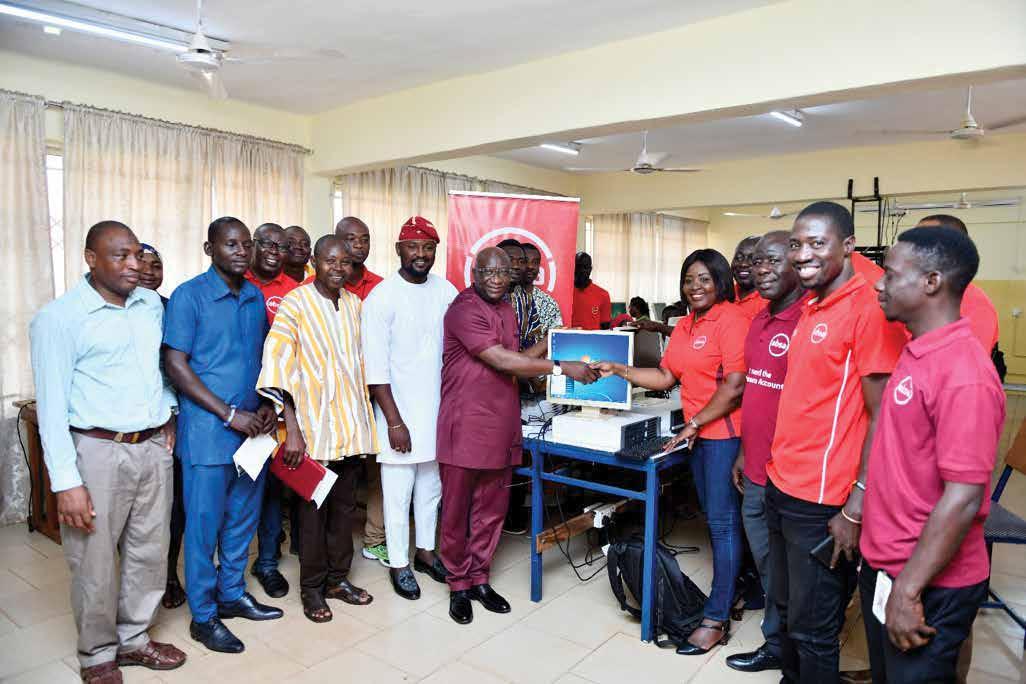
Handing over the computers, Nana Essilfuah Boison, Director of Marketing and Corporate Rela tions at Absa Bank said “As a bank, we believe strongly in
Ghana and this aligns with our commitment to Goal 4 of the Sustainable Development Goals (SDGs).”
Commenting, Dean of the Faculty
education forms a key component of its community-focused agenda to empower students with key digital and social skills to transit seamlessly from learning to earn ing.
ment e orts. Most importantly, even if the export restrictions prove e ec tive, they will not stop China from developing homegrown technolo gies eventually. In the “best” case, new sanctions would buy the US a few extra years of economic dom inance, at the cost of a peaceful economic relationship that has served both countries well for three decades.
Just days before the White House released the United States’ new National Security Strategy in October, President Joe Biden’s administration announced sweeping export restrictions aimed at stopping China from advancing technologically. “The world is changing,” the National Security Strategy observes – and the US is evidently responding by all but declaring economic war on China, using trade as its primary weapon.
Yet this development received scant mainstream media cover age. As Edward Luce of the Finan cial Times notes, “a superpower declared war on a great power and nobody noticed.” This is perhaps not surprising, given the ckleness of the news cycle and the competing spectacles of Twit ter layo s and cryptocurrency meltdowns. But the new US policy toward China will be far more consequential than either of those stories.
Consider US National Security Adviser Jake Sullivan’s rather sobering suggestion, in Septem ber, that it is no longer enough for the world’s largest economy simply to outcompete its econom ic rivals through technological innovation. The implication is that America must do whatever it can to hold those rivals back, and to in ict as much economic pain on them as possible. Yet this outlook clearly signals weakness. It is an admission that policies aimed at increasing America’s own economic competitiveness may have only limited success.
To be sure, the new export restrictions are being justi ed in the name of national security, to address the military-civilian
“dual-use goods” (technologies that are designed for commercial purposes but have military appli cations). National security is always an appealing rationale, which is probably why the new US economic policies vis-à-vis China have met with bipartisan approval. Nonetheless, the strat egy is deeply problematic.
First, while the national-security argument is easy to make, it is di cult to verify. Precisely such arguments led to a long and costly war in Iraq, which contin ued well after the war’s stated rationale – the alleged threat of Iraqi weapons of mass destruc tion – had been proven to be baseless. While China has certainly changed over the past ten years, it is not Russia. It is excessive to impose severe economic sanctions now out of fear of what China might do in Taiwan or the South China Sea. Worse, sanctioning China now could back re, by inducing its leaders to adopt a more aggres sive stance than they would have otherwise.
Second, the concept of dual-use goods is misguided, considering that every good has the potential for both civilian and military use. Soldiers need to be fed and clothed, so should food and clothing also be restricted as dual-use goods? Technology developed for commercial use is often used for military purposes, and the military has always been one of the main clients for modern technologies. It is unfor tunate that war has driven so much technological progress. But if national security is really the concern, the US should stop all
not just trade in technologically advanced products. The US may already be moving in that direc tion with the idea of “friend-shor ing.” But history shows that our friends today may not be our friends tomorrow.
In fact, America’s moves against China are less about national security and more about econom ic domination. If it continues (a big “if”), the impressive progress that China has made over the last three decades could indeed make it the world’s most important economy. But it is wrong to presume that global welfare is a zero-sum game, and that China’s ascent implies America’s decline. Moreover, it remains to be seen how e ective the new sanctions will be, given that the US imposed them unilaterally without consulting its allies. Export restrictions, in particular, call for close coordination, and there is already reason to doubt that some countries will go along with the US policy. The recent visit to China by German Chancellor Olaf Scholz and a high-level German business delegation came just days after Germany approved a controversial deal to let the Chinese shipping giant COSCO acquire a 25% stake in the Port of Hamburg.
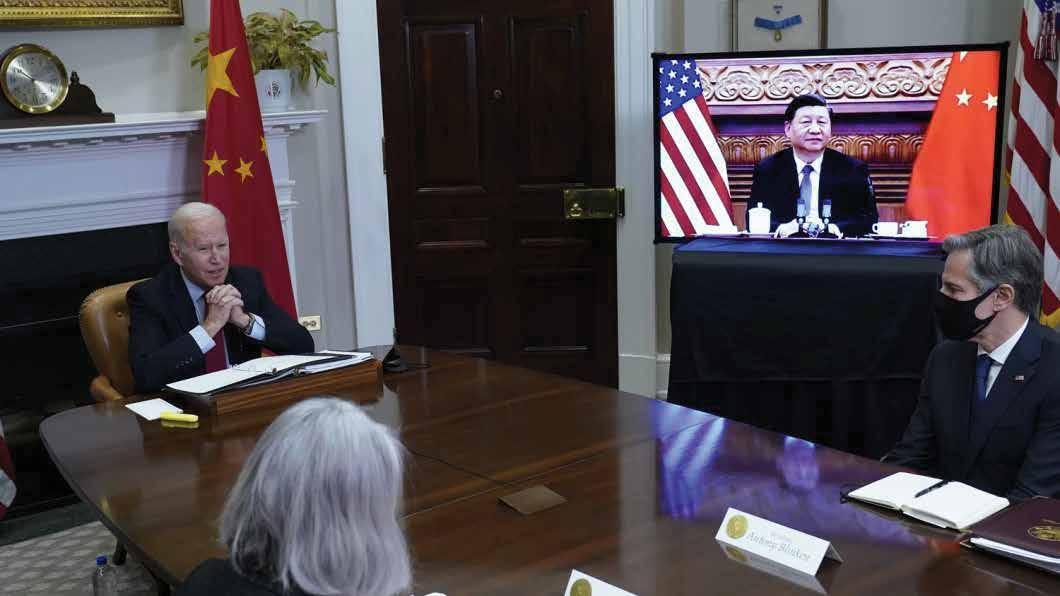
Similarly, ever since the Trump administration’s original announcement of export restric tions targeting ZTE and then Huawei, US authorities have struggled to minimize the adverse impact of such restrictions on US companies, and to eliminate channels allowing participants in global value chains to evade sanc tions. Global industry tends to stay one step ahead of US enforce-
Disruptions to complex global value chains will both increase prices for consumers and hamper technological progress. Coopera tion on crucial issues such as climate change will su er. And workers in the US still will not see the return of long-gone manufac turing industries. The biggest bene ciaries will be the consul tants and lawyers who are paid to help companies gure out how to cope with the intricate regula tions and new licensing require ments.
The US and many other advanced economies seem to have forgot ten how much they bene ted from China’s opening over the past three decades. Certainly, the process wasn’t perfect: foreign companies did not gain the market access they had hoped for in China, and US workers and regions directly a ected by import competition from China paid a heavy price. Governments never followed up with su cient complementary policies to com pensate those adversely a ected by China’s entry into the world trading system. But “choking” China’s economy by trying to stop its technological and economic development is no solution to these problems.
One hopes the more conciliatory tone struck by US President Joe Biden and Chinese President Xi Jinping at the G20 summit this month will prove fruitful. The US and China have managed to coex ist peacefully and prosper in the past, despite vast di erences in cultures and political regimes. At best, an economic war would give the US a Pyrrhic victory. At worst, it could start a new cold war and bring us one step closer to a military confrontation. Either way, it is in no one’s interest.
nization, business and country can be stalled, and reckons it is time for a rethink on the part of stake holders.
According to Ms. Cobbah, e ective communication remains signi cant as it builds the individual, communities, families, organisa tions, countries and them valu able.
Speaking at the launch of Strat comm Africa’s Brand Reputation Week and Awards in Accra on Wednesday, she told Business24 in an interview that “For us in Ghana and Africa, we believe that without e ective communication, our development process can be


communicate the business idea, the service or product so people can bene t from that becomes a challenge.
So, through this we hope people will see the value that brand repu tation brings to them, which is achieve through e ective commu nication.”
She also indicated that there was the need to heighten the aware ness of the need to build positive brands, the value, stressing that positive brand represents money, survival, progress, national devel opment.
all that but a lot of the time it is because we have not strategized and planned, how the business is going to grow over the next three to ve years. We don’t just want to encourage SMEs to just go out there and talk about their busi nesses, you have to build the repu tation, it is through what you do that you build a reputation, you plan, we encourage SMES to be particular about planning their businesses.”
At the end of the day, Stratcomm expects a reformed SMES “What we are expecting is a better appre ciation among di erent categories of our stakeholders -individuals,
tion Week is aligned with Global Entrepreneurship Week (14th -20th November 202), which is a special week set aside to celebrate entrepreneurs and empower them to scale up their businesses. As an organization with 28 years of expe rience in running a successful busi ness and delivering communica tion excellence, Stratcomm Africa is well-positioned to use its exper tise to support SMEs in Ghana to scale up.
Awurabena Agyeman, the CEO of Wear Ghana, urged SMES to “deliberately work on our brand reputations, at the end of the day, it all comes down to how we com municate – the essence of our brands, what it is we are trying to do, you communicate right down

ny whose mission is to empower individuals and entrepreneurs to capture opportunities in Africa has launched Fido Score,
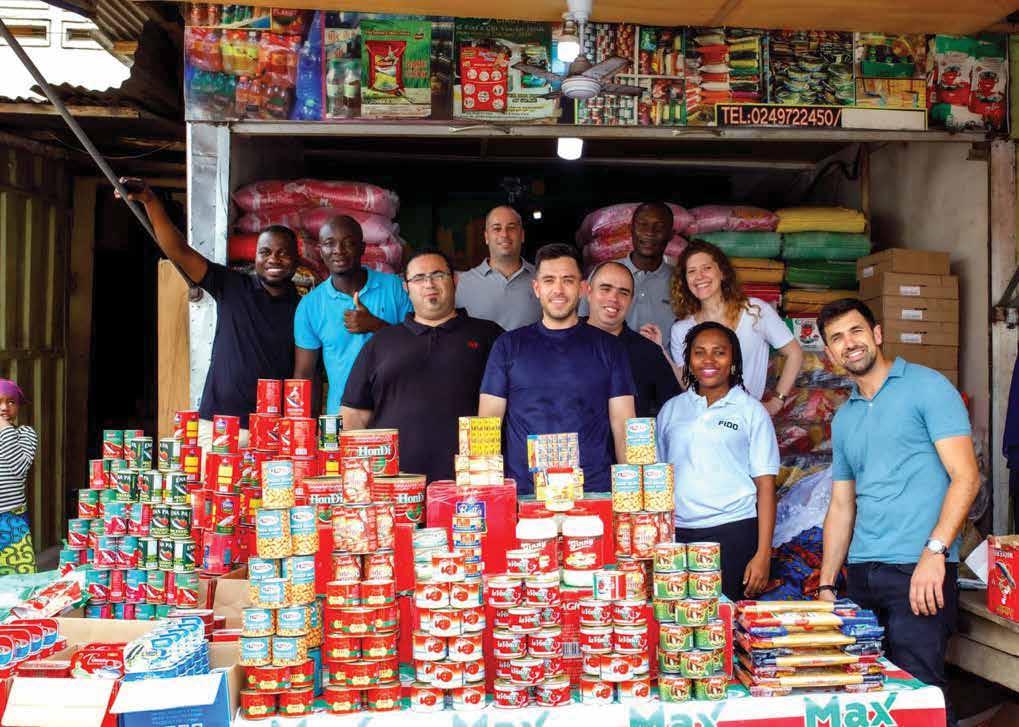
announced its new branding.

After serving over 450,000 customers and disbursing more than 2 million loans, Fido launched its new app, packed with new features and boasting a bold new pink look. The new Fido App is faster, easier to use and more secure. Customers will continue bene ting from instant access to cash, to start a business, pay tuition, or simply handle
whatever life throws their way.
Fido Score, the latest innovation, shifts power back to the people by empowering them to build and maintain a digital nancial track record. Based on this score, personalized o ers are matched to customers’ needs and abilities. Fido Score also educates custom ers on actions they can take to improve their score thereby unlocking improved o erings.
As the Fido product ecosystem evolves, so does the Fido brand.
“The black and yellow colours that served us for many years made room for a vibrant, bold, colour palette with pink at its
core. We’ve also created a new logo, imagery and communica tion style that is a re ection of our corporate personality: young, bold and transparent” said Alon Eitan, Fido’s CEO.
"We’re on a mission to empower individuals and entrepreneurs to take charge of their future. Fido Score is an important step towards that. Now our customers can create their own digital nan cial identity, and reap the bene ts of being visible to the nancial system”, he added.
Getting the New Fido App is very easy. Just download the Fido App from the Google Play Store, regis-
ter your details to create your account, and follow all the needed guidelines to successfully apply for your rst loan. Your Fido Score feature will be calcu lated after completing your rst loan and with every action you take on the Fido app.
Fraud disclaimer:
• You can only get Fido Loans through the Fido App on Google Play Store.
• Fido will never ask you for money before giving you a loan.
• Fido does not have any agents.
• The Fido facebook page is veri ed with a blue checkmark.
• If you’re in doubt, reach out to Fido support
By Philip GebuTeams have started arriving in Qatar ahead of the world cup this week end. There are many reports and complaints coming from Qatar however, these chal lenges cannot take away the shine and the economic bene t which must be the focus. Qatar Tourism revealed the opening of more than 20 hotels, resorts and new tourist destinations in the country ahead of the FIFA World Cup Qatar 2022, stressing that these projects and tourist attrac tions will be ready to receive fans in the tournament. Qatar Tour ism stated that 2022 represents an unprecedented year in the process of development witnessed by the State of Qatar, its transformation into a global tourist destination, and its aspira tion to increase the number of its visitors to six million visitors annually by 2030. The world cup will be the driving force to achiev ing their ambitious goal. It still remains a fact that sport drives tourism and investing in the right infrastructure delivers result. This is proven fact be it the world cup, the AFCON, Olympics, the champion leagues, the rugby world cup just to mention a few. Qatar is taking maximum advan tage by promoting their tourist attractions to visitors. Ghanaian spectators who will be in Qatar will need to take advantage and not only attend the games but get involve in tourism.
Below are some of the attractions visitors can see.
Al Maha Island features six high-end restaurants including Zuma, LPM, Billionaire and Carbone, as well as other eateries and attractions such as Nammos Qatar beach club and Lusail Winter Wonderland. The island also features Al Maha Drive, a unique driveway experience reserved only for supercars and classic cars.
Visitors to Lusail Winter Wonder land will be able to relax on the beach in the sun while enjoying festive games, rides, live enter tainment and food and drink. Lusail Winter Wonderland prom ises to bring “winter” magic to the Middle East.
Located in the heart of Lusail, this shopping, commercial and residential area has the bold ambition to become the Champs-Élysées of the Middle East. Lusail Boulevard opened last week ahead of the Qatar World Cup with a three-day family friendly festival.
West Bay North Beach Project
An expected launch by Novem ber 20 in readiness for visitors to the Qatar World Cup will see the highly anticipated launch of Qatar Tourism’s West Bay North Beach Project, with the initial launch comprising three new beaches in the heart of Doha.
974 Beach Club
Located next to the iconic 974 Stadium, this beach club features a ve-star beachside experience with private bungalows, water-based activities, beach sports, luxury retail outlets, food and beverage kiosks, a big screen, live DJ sets and other cultural activities.
La Mar Beach Club
Recently opened in October, this luxury beach lounge in the Inter Continental Doha Beach & Spa overlooks unparalleled views of the West Bay skyline. Guests can swim in the waters while enjoy ing cabanas, sunbeds and private loungers.
Museum of Islamic Art
Qatar’s iconic Museum of Islamic Art reopened to the public on October 5, ahead of the World Cup following a year-long facili ties enhancement project. The re imagination of its permanent collection of more than1, 000 objects will create a new visitor-focused layout and storyline, allowing the museum to showcase its world-renowned exhibits.
Fuwairit Kite
in October. The hotel o ers bespoke services and exquisite culinary o erings on a Mediterra nean-styled island.
Corinthia
Located on the waters of Porto Arabia in The Pearl-Qatar, the architecture is designed to echo the sails of traditional Qatari dhows. The private club, set to open before the end of 2022, will o er exclusive membership for yacht owners and residents by invitation only.
Fuwairit Kite Beach opened in October. It is nestled along a natural lagoon and north of Doha. The modern resort has consistent winds, making it ideal for kitesur ng.
St.
The exclusive island getaway in the heart of Porto Arabia opened
Visiting some of these attractions will bring immense bene t to yourself. According to a study by Amit Kumar, Matthew A. Killing sworth, and Thomas Gilovich from Cornell University, that money spent on doing something (called “experiential purchases”) will leave you with a longer-last ing sense of happiness than money spent on having some thing (called “material purchas es”). The study says that “waiting for experiences tends to be more positive than waiting for posses sions.” And, it goes on to say that “people derive more happiness from the anticipation of experi ential purchases and that waiting for an experience tends to be more pleasurable and exciting than waiting to receive a material good.” So be happy and have fun whiles in Qatar. Furthermore, In a randomized controlled trial conducted by Austrian research ers and published in the Interna tional Journal of Environmental Research and Public Health, one of the many great travel bene ts is that it can reduce stress levels and anxiety. The researchers found that even just one short-term vacation (~3 days in length) “independent of the mode, has large, positive and immediate e ects on perceived stress, recovery, strain, and well-being.” Furthermore, the bene cial e ects last quite a while after you return home. “The e ects can still be detected at 30 days (recovery) and 45 days (well-being and strain) post-vaca tion.”
Additionally, Mark Twain said; “Travel is fatal to prejudice, bigotry, and narrow-mindedness, and many of our people need it sorely on these accounts. Broad,
wholesome, charitable views of men and things cannot be acquired by vegetating in one little corner of the earth all one’s lifetime.” When you visit a new place, meet new people, and learn about a new culture, wheth er through group travel or when traveling solo, the bene t to your life is immense, but it also bene ts your friends, family, and other loved ones. Not only will you get to experience new things, but you’ll also bring what you learn back to your school, work place, and hometown. Finally, According to a study by the Global Commission on Aging and Transa merica Center for Retirement Studies, in partnership with the U.S. Travel Association, travel decreases the risks of heart attacks and makes your brain healthier. The study determined that men who take an annual vacation are 30% less likely to die from heart disease, among other ndings. “Foreign experiences increase both cognitive exibility and depth and integrativeness of thought, the ability to make deep connections between disparate forms,” Adam Galinsky, a profes sor at Columbia Business School, tells The Atlantic. Cognitive exi bility plays a major role in overall creativity, de ned as the ability for a person to be able to enter tain various ideas and viewpoints one after the other.
Write to forealdestinations@gmail.com / info@ forealdestinations.com. Visit our website at www.forealdestinations.com or call or WhatsApp +233(0)244295901/0264295901.Visist our social media sites Facebook, Twitter and Instagram: FoReal Destinations

Forecasts indicate that Qatar's economy will grow by 3.4 percent in 2022 and 2023, thanks to the World Cup boost…will Ghana consider hosting it anytime soon- Part 2Philip Gebu is a Tourism Lecturer. He is the C.E.O of FoReal Destinations Ltd, a Tourism Destinations Management and Marketing Company based in Ghana and with partners in many other countries. Please contact Philip with your comments and suggestions.
After two years of virtual gather ings, the prestigious annual AfricaCom event – Africa’s largest technology conference – made its in-person return this year.
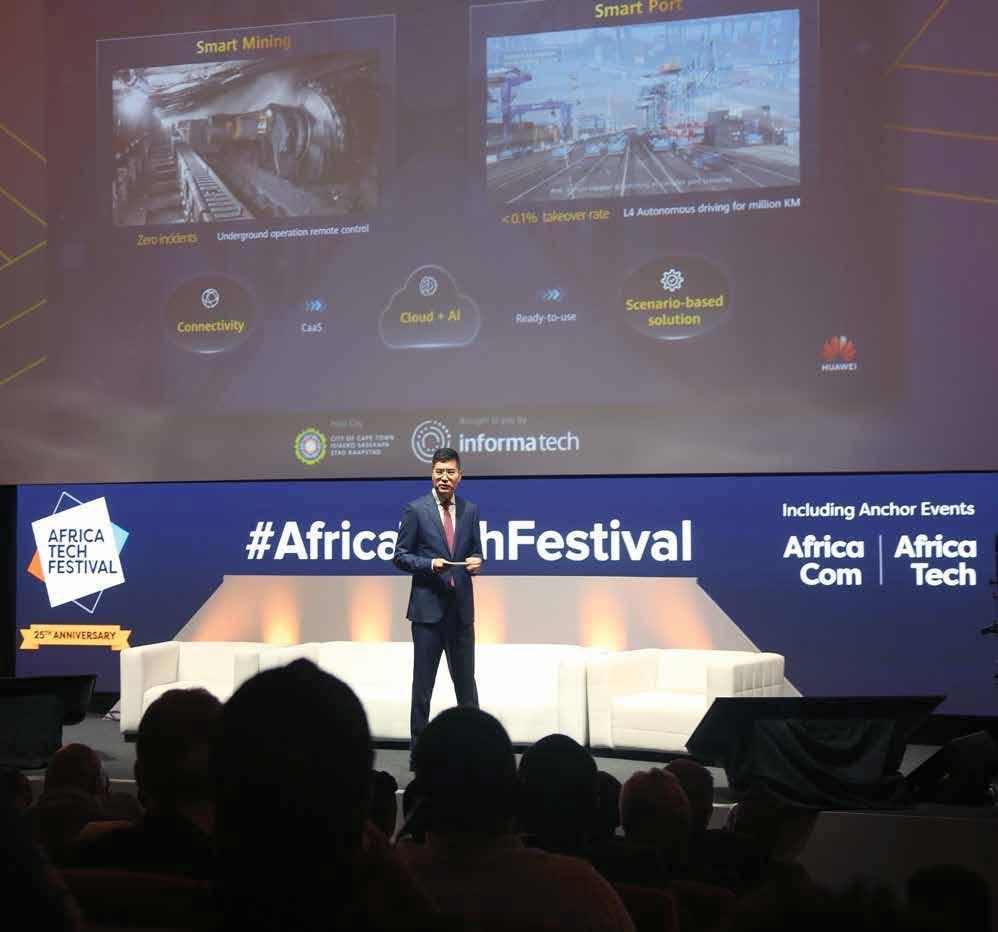
Taking place at the Cape Town International Conference Centre (CTICC) from 7 to 11 November, the event brought together African operators, industry elites, and opinion leaders.
As a leading industry player, Huawei had a big presence at the event. With the theme “Lighting up the Future,” it shared insight on cutting-edge trends in the telecom industry, including 4G/5G co-development, FMC intelligent connectivity, digital operations transformation, and green development leading the future of digital networks in Africa.
During the conference’s opening session, Leo Chen, President of Huawei Sub-Saharan Africa Region delivered a presentation entitled "Lighting up the Future with Nonstop Innovation". In it, he outlined Huawei’s latest ICT development concepts and
successful digital transformation solutions.
“The high resilience and rapid growth of the continent’s digital economy, technologies such as 5G, arti cial intelligence, and cloud are evolving rapidly and the adoption of ICT in a wide range of industries is growing,” said Chen. “They are supporting Africa in advancing the technical revolution, boosting productivity and increasing jobs.”
He pointed out that over the last two decades, Africa has made signi cant progress in digitaliza tion. It has established the rst-mile infrastructure, connect ing countries on the continent to the global internet. Additionally, it has tripled its middle-mile
Whilst there is appetite for a greater uptake of digital technolo gies, constraints including a skills de cit, and lack of viable technol ogy solutions are impeding the advance of ICT adoption. Chen pointed out there are three major ways to break through these bottlenecks.
“We need to further deepen connectivity to connect more people, enterprises, and scenari os; unleash digital productivity and enable digital transformation in multiple industries; increase the ICT industry’s energy-e cien cy and leverage ICT technologies to reduce emissions across all industries,” he added.
sea, and mining is an important source of wealth creation for many African countries.
As Africa's digital ship sails into the future, it requires a strong tail wind to propel it forward. Chen called for more favourable indus trial policies, and more coopera tion between public and private sectors. To this end, Huawei has set up four innovation centres in Africa, launched several plans to support the development of small and medium-sized enterprises (SMEs), and will train 100 000 digital champions in Africa over the next three years.
At AfricaCom, Huawei also show cased a range of innovative tech nologies and solutions, including
A Deputy Minister of Finance, Abena Osei-Asare, has urged insurance companies to adopt business models that embrace technology for service delivery. She said technology was adding value to insurance business, adding that digital platforms would make the process of doing insurance faster and much less cumbersome.
Mrs Osei-Asare made the call at the inauguration of a new head o ce building for Activa Interna tional Insurance Company (Ghana Ltd) in Accra.
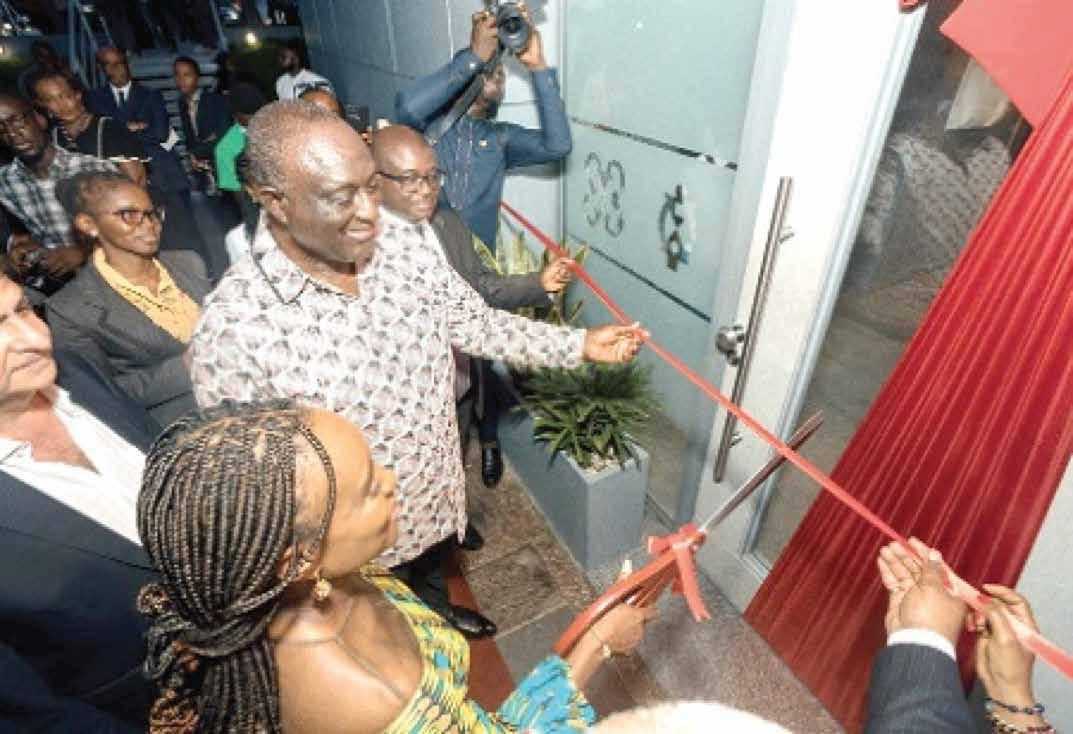
Known as the Activa Square, the building — which is the rst phase of a three-phase complex — consists of a basement for park ing, a ground oor and three
other oors including the roof top level for entertainment.
Mrs Osei-Asare entreated insur ance companies to join forces to intensify public awareness cam paigns on the importance of insurance.
The deputy minister, who was the guest of honour for the occa sion, further urged the compa nies to partner the regulator, the National Insurance Commission, to ensure standardisation across the sector.
She commended Activa Interna tional Insurance Company for the project.
Mrs Osei-Asare said it was important for insurance compa nies to have complementary hardware and software to e ec tively address concerns of the
public.
Such software, she said, must be anchored on people, partnership and technology which must ensure e ective communication during sales and claims payment time, and also promote profes sionalism in handling clients.
The Chairman of Activa Insur ance Group, Richard Lowe, expressed appreciation to the company’s clients, saying with out them the company would be non-existent.
The Managing Director of Activa Insurance Ghana, Benjamin Yamoah, said the new head o ce signi ed the fruit of Activa’s hard work over the past 13 years that it had operated in the country. He said work on the building
started in September 2020, and though its progress was heavily impacted by the COVID-19 pandemic, the building was handed over to Activa in July 2022.
Mr Yamoah expressed gratitude to the contractor, Key Contract ing Company Ltd; the consultant, DC&M; the Project Manager, as well as the local building commit tee for the work done.
Also present was the Minister of Trade and Industry, Alan Kyere maten; the Head of Finance of the National Insurance Commission, Dr Mahama Wayo, and the Presi dent of the Ghana Insurers Asso ciation, Seth Aklasi.
A Deputy Minister of Finance, Abena Osei-Asare, has urged insurance companies to adopt business models that embrace technology for service delivery
The escalating Sino-American rivalry and the broader concerns about China’s economy have caused Western rms to reevalu ate their operations there – and rightly so. Given the uncertainty surrounding President Xi Jinping’s economic policies and geopolitical intentions, it may be time for investors and corporate leaders to consider scaling back their exposure to Chinese assets and markets.
The events of the past year, particularly Xi’s dogged refusal to ease his strict zero-COVID policy and his con rmation as China’s rst three-term president, have spooked global investors. Like wise, Xi’s “common prosperity” agenda, which aims to redistrib ute wealth from the wealthy to the poor and rein in the country’s new business elite, has been viewed as anti-business and dam aging to economic activity.
As part of his common prosperity campaign, Xi pledged that the authorities would “reasonably regulate excessively high incomes and encourage high-income people and enterprises to return more to society.” With this kind of rhetoric, it is no wonder that China’s stock market dropped roughly 20% last year. China’s

policies have also led to vast capi tal out ows and an accelerated sell-o of Chinese stocks. Accord ing to the Institute of Internation al Finance, investors withdrew $7.6 billion from Chinese equities last month, along with $1.2 billion from the bond market.
Of course, investors’ reactions to economic trends and political developments depend on their portfolios, diversi cation needs, risk appetites, and investment horizons. But prudent investors and business leaders will use this opportunity to assess their port folios’ risks and consider what to do about their China positions. Clearly, the widening gulf between the United States and China and the broader shift toward deglobalization will upend how multinational compa nies run their business. Speci cally, companies must rethink how they obtain nancing, hire across borders, and allocate capi tal. They should also consider centralizing procurement and building resilient supply chains. What paths could investors reas sessing their China exposure take? One option is to divest from all of their Chinese assets, reduc ing their exposure to zero. But reducing exposure to China is likely to be a protracted process,
whether it involves shrinking a portfolio of publicly-traded Chinese stocks or unwinding a private equity investment. Repo sitioning will also likely be com plicated, as sellers must nd buyers in an already-challenged valuation market.
Moreover, investors looking to unwind their Chinese holdings must consider the e ects on their taxes, intellectual-property rights, and transfer pricing, as well as many other stranded costs. And corporate investors who have long been bullish on China would need to come to terms with the possibility that they might not have any exposure to China’s economy when growth begins to pick up.
Alternatively, investors could accept their sunk costs, write down the value of their invest ments, and still retain some expo sure to China. In essence, this would mean acknowledging that previous investments cannot be recovered while holding o on making new ones.
In the context of an equity portfo lio, a sunk-cost approach would result in recorded mark-to-mar ket losses, leaving investors with the option of retaining their posi tions in the event of a market
rebound. Similarly, a corporation that owns a factory in China may write down its asset value. But instead of shutting it down and writing it o entirely, it could run it as a going concern without expanding output or making new capital commitments, thereby maintaining a foothold in China when the economy nally recov ers.
Another option is to double down. Investors could not only hold on to their current China exposure, but also take advantage of low valuations and market weakness to enlarge their Chinese footprint. But even in this scenar io, global investors would be wise to recalibrate their investment strategies by adding a local part ner to minimize the risk of expro priation.
Companies that decide to stay and increase their presence in China, however, could be forced to operate as ring-fenced busi nesses. This would likely compli cate nancial reporting and increase their regulatory burdens, particularly in the face of rising trade protectionism and regional balkanization.
Ultimately, however, investors and corporations committed to investing in China must be inno vative in how they do business in – and with – China. They would need to reevaluate the gover nance and board-oversight struc tures of new local entities that may trade only on Chinese stock markets. They would also have to rely on unconventional metrics, since traditional measures such as macro statistics, P/E multiples, internal rate of return, Sharpe ratios, and volatility measures similar to the VIX are less reliable in such a fast-moving geopolitical, economic, and nancial environ
Whatever choice they make, Western investors in China face a completely di erent economic terrain than the one in which they operated for more than a decade. This shift re ects domestic politi cal developments such as Xi’s iron grip on power. But it also attests to a new geopolitical order in which China and the US com pete for economic, technological, and military superiority. In a rapidly deglobalizing world, investors must consider their next moves carefully.

In the wake of the recent structur al failures of buildings in Ghana costing lives of persons, property and resources of developers, there is the need for everyone to be very conscious of what goes into your building project wheth er you build it yourself or you have someone build for you.
A recap of literature between 2010 and 2016, Ghana recorded 15 structural failures across the country resulting in 35 loss of precious human lives and proper ty and over 1,000 causalities according to Creative Commons Attribution International, (2018). Mention is not made of data before 2010 and after 2016. To correct this anomaly in the system, the founder and CEO of 66 ENGINEERING LIMITED Mr. Daniel Kontie speaking at the website launch program said, he has been an advocate over the years promoting and creating awareness on the importance of building right and helping state institutions enforce the laws on adherence to best practices and the principles of sound structural integrity.
Taking this agenda to another dimension in the year 2020, he decided to form a team of topnotch civil engineers and industry experts in building and construction which led to the execution of several building projects across the length and breadth of the national capital Accra. Early this year, he deemed it t to formalize operations of the team hence, the birth of 66
ENGINEERING LIMITED.
As our slogan posits “bringing imagination to reality” we do everything construction from conceptualization to architectur al drawings, construction to nishing of all building projects be it commercial or residential. We employ state of the art archi tectural and construction tech nologies such as BIM for architec tural designs and drawings, Aug mented Reality (AR), Arti cial Intelligence (AI) and EDGE tools and standards to ensure high structural integrity as well as eco-friendliness while cutting cost considerably. This gives our clients value for money and saving a whole nation of lives lost every year through structural failures.
The other wing of our services is the supply of all variety of build ing and construction materials in Accra and beyond. We supply concrete blocks, 4” 5”, 6”, 8” both solid and hollow across Accra. Others include, iron rods, galvanized steel pipes and wire meshes, U-channels, balustrades, roo ng sheets, marine boards, latrite (gavels for lling), quarry chippings, river and pit sand, cylindrical concrete pipes-rein forced and non-reinforced, culverts, U-drains, jersey barri ers, pavement blocks, concrete slabs, quartzite stones, marble and deco stones for cladding, sale of heavy-duty equipment and rentals, cement of all brands et cetera.
We also undertake renovation building projects et cetera. We are currently ranked among the top ve (5) construction com panies in Ghana having entered the industry just for a few years. We are calling on all Ghanaians particularly those living in the diaspora who are sending money home for family and friends to build only to come home and realized that there isn’t any house
anywhere built for them, to visit us. We will agree on something and your project will be done for you in compliance with all indus try and international best practic es and quality standards. You can always count on us.
Our doors are also opened to welcome investors who believe and wants to invest in us as plans are underway to acquire and install our concrete products manufacturing plant, already mix concrete manufacturing plant etc.
Visit us in Tema Community 25 Accra- Ghana and all your build ing needs will be taken care of. You can also reach us on our digital platforms” www.66engi neering.com, 66 Engineering Ltd on Facebook, 66_engineering on Instagram, LXVI Engineering on LinkedIn, @66engineering on TikTok, 66 Engineering on Twit ter, 66 Engineering on Jiji and 66 Engineering on YouTube. 66 ENGINEERING: BRINGING IMAG INATION TO REALITY! Stay tuned for more updates…
Stanbic Bank Ghana in partner ship with Ghana Enterprises Agency (GEA) has launched the maiden edition of the Women Entrepreneurship Workshop at the Stanbic Business Incubator in Accra.
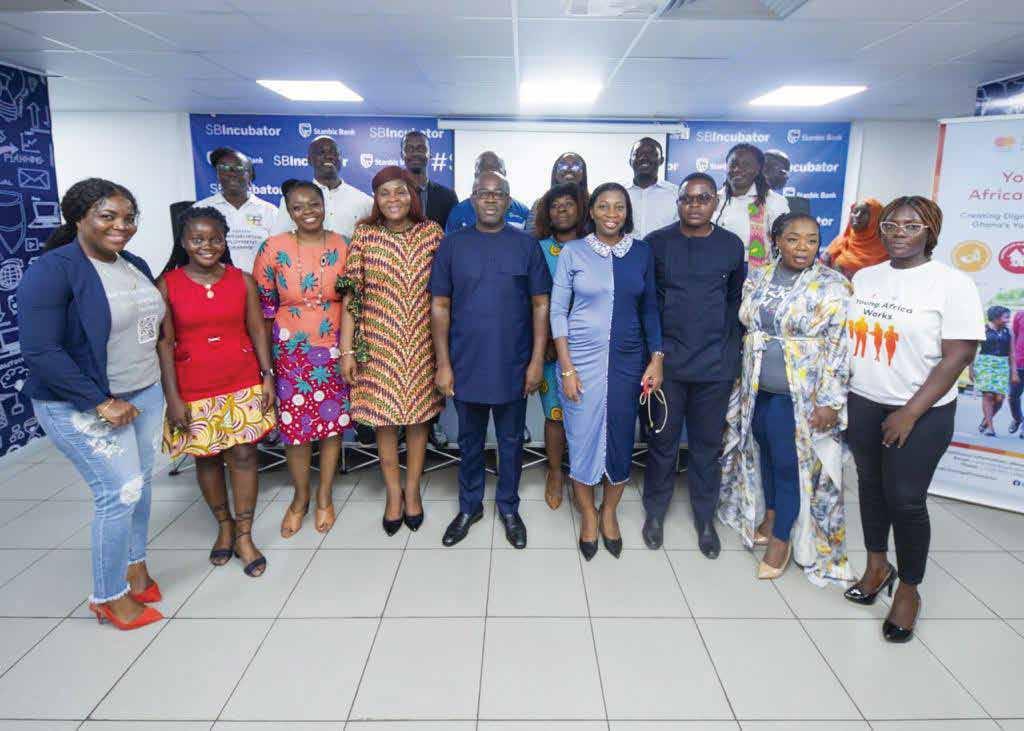
The two-day workshop was designed to provide female owners of Micro, Small and Medium Enterprises (MSMEs) with the necessary tools and knowledge to grow their busi nesses. Women from various sectors of the economy attended the workshop.
Speaking at the event, Eric Tsiri, Head of Enterprise Banking at Stanbic Bank emphasized the bank’s commitment to support female entrepreneurs and ultimately drive Ghana’s.
He stated that, “In Ghana, the private sector is dominated by MSMEs, contributing an estimat ed 70% of Ghana’s GDP and make up approximately 85% of labour
in the Ghanaian manufacturing industry. At Stanbic Bank, we believe that Ghana is our home and we drive her growth. Because of this we are committed to helping MSME’s to deal with the many challenges they face in the daily running of the business. That is why we have partnered with GEA to put together this workshop to equip entrepre neurs with technical skills and knowledge to enhance their busi nesses.”
“Although Ghanaian SMEs have the potential to increase their contribution to economic and national development, many of them are saddled with numerous challenges that hinder them from doing so. At Stanbic, we under stand the critical linkages provid ed by SMEs to employment generation and national develop ment. Thus, we continue to fash ion out nancial solutions and other interventions including capacity building through our
Stanbic Incubator to address some of these chalenges” He added.
Eunice Dewi Adjei of the GEA Apprenticeship to Entrepreneur ship Department, spoke to the participants about bookkeeping and accounting records. She also thanked the Stanbic Bank for partnering with them to make the workshop possible.
She said, “We are very grateful to Stanbic Bank for their support. This is a show of their commit ment to the growth of Ghana through their support for MSMEs and their commitment to women as well. As an MSME owner, it is important to know when to eat your fruit and when to plant your seed. It is also important to have the right tools to keep records and track your progress. This workshop is a good opportunity for these women to get the knowl edge they need to succeed and grow their businesses’’.
One of the facilitators for the programme Paulina Aku Okai (Finance and Value Manager, Stanbic Bank) took the partici pants through processes for preparing Financial Statements, Pro t and Loss Statements and Balance Sheet. Others were Mami Serwaa Amoakohene, GEA Great er Accra Regional Director, who spoke on ‘Doing Business in Ghana’ and a team from Nyaho Clinic led by Dr. Faiqa Bashir, who sensitized the ladies on breast cancer and provided free screening services at the work shop.
Creating value for all stakeholders remains an imperative objective for Stanbic bank as part of their mission to drive national growth. The bank continues to provide the necessary nancial assistance and accessible loan facilities to businesses across the country in need to show that with Stanbic, it can be.












November 18, 2022
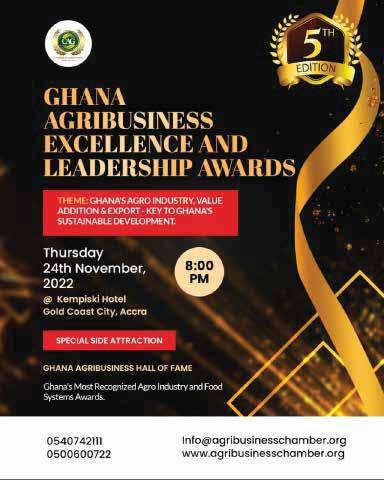
leave no one behind. This requires fervent commitment to eradicate poverty in all its forms, end discrimination and exclusion, and reduce inequalities. Yet, some people who have important role to play as change agents, are often excluded.
A deliberate e ort to empower those being left behind will bene t society at large. Yakubu is an example of someone who was left behind but now feels included and empowered, thanks to a deliber ate support.
“I was just sitting idle at the mercy of others but now I am happy to be busy for a good cause”, Yakubu Issakah, a person living with a mental health disability bene ting from a solar irrigation vegetable farming at Banda Ahenkro disclosed.
Like Yakubu, many people who often face exclusion only need a ‘little push’ or support to reach their full potential as humans. Reducing inequalities requires a conscious e ort in identifying who is being left behind and why they are being left behind to inform e ective measures to address the root causes. With a 24acre land from the chiefs, solar irrigation facilities from the United Nations Development Programme (UNDP)
capacity development from Agri culture Extension O cers in the Banda District of the Bono Region of Ghana, Yakubu and about 250 persons with disabilities, are making a living with their envi ronmentally friendly vegetable farming.
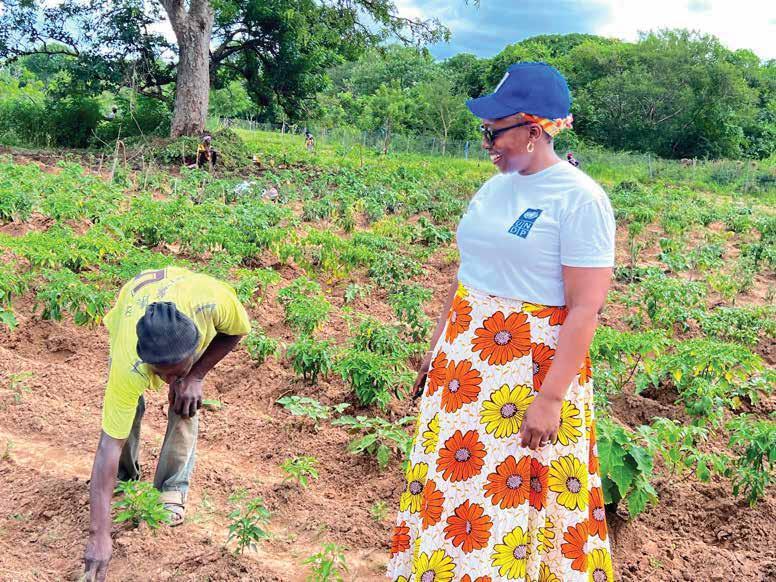
Like Yakubu, Rebecca was written o because of speech disability, but she is now playing an import ant role in safeguarding the envi ronment for our future. She is strictly following lessons taught them in organic farming by using neem tree as a pesticide and com post, to grow fresh vegetables. Addressing all forms of discrimi nation
Mostly, a major cause of people being left behind is persistent forms of discrimination including disability, gender, and age. Yakubu is a man with a disability who needed support. Just like him, by ensuring that the support provided is inclusive, Rebecca who is a woman also feels empow ered to protect the environment while seeking to improve her livelihood. Similar to Rebecca’s experience, women like Hannah are driving change at the grass roots.
“Now, we can proudly say we have peace of mind. This is because we are now able to contribute nancially to our fami lies’ development”, noted Hannah Chiama, President of Ayorya Women Groundnut Farming Asso ciation.
Hannah leads a group of 300 amazing women in Ayorya, who needed access to land and nance to produce and add value to groundnut. With land from the chiefs and leadership from their Queen Mother - Nana Serwaa Kruwaa, they managed to access the UNDP GEF small grant to set up a groundnut factory. They now produce groundnut paste, oil, and vegetables for major markets in the Kintampo South District of the Bono East Region of Ghana.
To succeed in leaving no one behind, we must also work across generations and build bridges. “What is unique about our aqua ponic project approach is that we are strengthening social networks because we connect young people to older farmers for experience and knowledge sharing”, stated young Zuweira Yakubu, Project Coordinator at Link Ghana – a grantee of UNDP GEF Small Grant Programme in Tain in the Bono Region.
Like the other interventions,
through the UNDP GEF Small Grant Programme, over 1200 farmers including young people are combining sh farming with vegetable and crop cultivation. All these initiatives are creating jobs and improving incomes, nutrition, and environmental sustainability.
“I never knew we can use water for sh farming and now I use the pond water to produce vegetables. I am also training my daughter who has graduated from the university in agriculture to take over, and also training six other young girls”, said Mr. Ko Nyame kye.
The stories of Yakubu, Rebecca, Hannah, Zuweida, and Ko are clear examples of how deliberate support can help empower people and transform lives and communi ties.

It is obvious that, people must always be at the centre of develop ment and development must be inclusive, equitable, and sustain able to the bene t of all. The success of our heroes and hero ines in this story demonstrates that inclusive development is possible if a deliberate e ort is made to collaborate and support those being left behind.
It is also important to ensure that, while we pursue development, this is not at the peril of the envi ronment. Living in balance with nature means we make a conscious e ort to work together in addressing various forces including systemic discrimination, technological advances, climate change impacts, and con icts. This way, we can leverage the full potential of all, to advance the attainment of the Sustainable Development Goals (SDGs).
Addressing inequality requires actions at all levels. Working together will be critical in upscal ing successful development inter ventions to ensure that all segments of society including women, youth, and persons with disabilities lead decent, digni ed, and rewarding lives in a healthy environment.